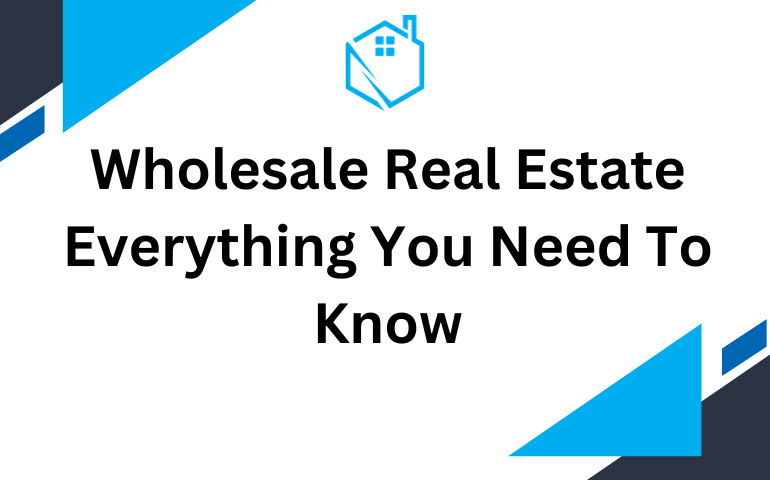
Mortgage Dove
Wholesale Real Estate Everything You Need To Know
Real estate investment can seem like a daunting world, especially with the substantial costs and complexities associated with property transactions. However, for those seeking an entry point that requires minimal capital and offers quick profits, wholesale real estate stands out as an enticing opportunity. These steps to successfully navigate this realm, its pros and cons, a comparison with flipping houses, strategies for success, and addressing common queries about this intriguing investment avenue. Wholesaling real estate is a savvy investment strategy that empowers investors to make profits without the need to purchase a property or commit to a down payment. In essence, a wholesaler secures a contract with a seller to buy their property at a discounted price, and subsequently assigns this contract to an investor at a higher price, pocketing the difference as a wholesale fee. Distressed properties, often overlooked by traditional buyers, become the focal point for wholesalers. Imagine a homeowner with a property in disrepair, hesitant to invest in renovations. A wholesaler steps in, securing the property at a bargain price of $90,000, and then assigns the contract to an investor willing to pay $100,000, resulting in a lucrative $10,000 profit without ever owning the property. Becoming proficient in wholesale real estate requires diligence and strategic planning. Here are seven essential steps to guide aspiring investors: Like any investment strategy, wholesaling real estate comes with its own set of advantages and challenges. Pros: Cons: While both wholesaling and flipping involve profiting from distressed properties, they differ significantly in execution. Flipping requires purchasing a property, investing in renovations, and selling it for a profit. On the other hand, wholesaling entails connecting sellers and investors without the wholesaler ever owning or renovating the property. Wholesaling carries lower risk, requires less capital, and has a quicker turnaround compared to flipping. To prosper in the realm of wholesale real estate, aspiring investors must adopt a strategic approach that encompasses various key elements: Do Networking: Building a robust network of investors, buyers, and industry professionals is paramount. Successful wholesalers actively cultivate relationships to expand their reach and increase opportunities. Conduct Property Selection: Identifying distressed properties that align with investor preferences is crucial. A keen eye for properties with potential and the ability to present them enticingly to potential buyers contribute to success. Ensure Efficient Organization: Streamlining tasks and processes is essential for managing multiple deals simultaneously. Successful wholesalers exhibit organizational prowess, ensuring that every step in the wholesale real estate workflow is executed seamlessly. Be Open To Technology Adoption: Leveraging technology, including Customer Relationship Management (CRM) software, mobile applications, and a well-constructed website, enhances efficiency. Embracing digital tools facilitates smoother communication, deal management, and market outreach. Do Continuous Learning: The dynamic nature of real estate necessitates a commitment to continuous learning. Successful wholesalers remain informed about market trends, negotiation strategies, and evolving industry dynamics. Each wholesale real estate experience becomes an opportunity for growth and refinement of skills, ensuring long-term success and satisfaction for both sellers and buyers. How risky is wholesaling real estate? While all investments carry some level of risk, wholesaling is considered lower risk compared to other real estate strategies. The key lies in thorough research and effective networking. Is it possible for anyone to start wholesaling real estate? Yes, anyone can start wholesaling real estate, making it an attractive option for new investors. However, success may take time, and connecting with a mentor can be beneficial. What are the skills that make a wholesaler successful? Successful wholesalers possess strong negotiation skills, efficient organizational abilities, and a keen understanding of market dynamics. Building and leveraging a network is also essential. What is the best way to get started with virtual wholesaling? Yes, virtual wholesaling can be suitable for beginners as it requires minimal upfront capital. It allows investors to tap into various markets, making it a versatile option for those starting in real estate. Is it possible to wholesale real estate part-time? Wholesaling real estate can be pursued part-time, but success often correlates with the time and effort invested. Building a network and consistently seeking opportunities are essential for part-time wholesalers. In conclusion, wholesale real estate presents an enticing gateway into the world of property investment. By understanding the intricacies, embracing strategic approaches, and continuously learning, investors can navigate this landscape successfully. Whether you're a seasoned investor or a newcomer, the potential for substantial profits and low entry barriers make wholesale real estate a compelling avenue for financial growth. Mortgage Dove, with its commitment to empowering investors, stands as a valuable ally on this journey, providing the support and resources needed to thrive in the dynamic realm of real estate wholesaling.What Is Wholesaling Real Estate?
7-Steps To Do Wholesale Real Estate Like A Pro
Pros And Cons Of Wholesaling Real Estate
Difference of Wholesaling Real Estate and Flipping Houses
How to Succeed at Wholesale Real Estate
5 FAQs About Real Estate Wholesaling
Bottom Line
"Mortgage Dove makes home financing convenient for every American. You can count on us to provide a home buying experience tailored to your personal needs and financial situation. We strive to give you the peace of mind that your home financing goals can be achieved.”

Mortgage®
www.mortgagedove.com



-and-how-does-it-work.png)